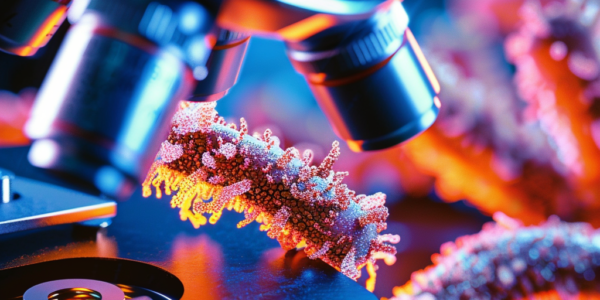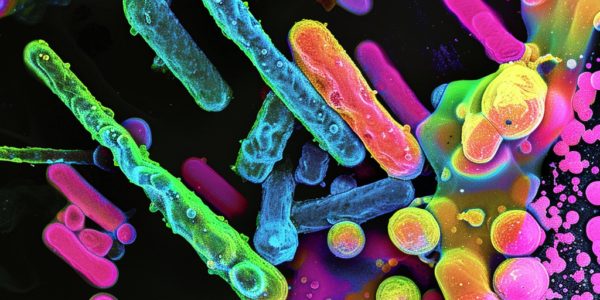Study Reveals Role of Neonatal Gut Bacteria in Serotonin Production and Immune Tolerance
A recent study in Science Immunology reveals the role of neonatal gut bacteria in producing serotonin and promoting immune tolerance. The study emphasizes the significance of early bacterial colonization in children with conditions such as asthma and food allergies. Understanding the impact of neonatal gut bacteria on serotonin production is crucial for comprehending immune tolerance development and addressing related conditions.
New Bacteria Found in 50% of Colon Cancers, Study Reveals
Groundbreaking study in Nature reveals new bacteria found in 50% of colon cancers, with potential implications for treatment and screening. Colon cancer rates among younger individuals have nearly doubled, prompting concern and speculation about the role of this bacteria in the surge. This discovery offers potential for targeted treatments and improved screening protocols to combat the growing threat of colon cancer.
Age and Gender Impact Antibiotic Resistance, Study Finds
A recent study has found that age and gender play key roles in antibiotic resistance, with the likelihood of having a bloodstream infection resistant to antibiotics being linked to these factors. The study, which involved almost one million individuals across Europe, revealed different antimicrobial resistance trends for various bloodstream infections. Understanding these patterns is crucial for developing better strategies to combat antimicrobial resistance and safeguard individuals from challenging infections.
Canadian Lake Bacterium Shines New Light on Ancient Photosynthesis
University of Waterloo PhD student turns a failed experiment into a groundbreaking discovery, shedding new light on ancient photosynthesis. The unexpected bacterial sample from a Canadian lake has the potential to revolutionize scientific understanding of photosynthesis and its origins, showcasing the importance of embracing unexpected outcomes in scientific exploration.
Deadly Bacterial Infections Spread in Tap Water, CDC Warns – Are Your Faucets Safe?
CDC warns of deadly bacterial infections spreading in tap water, including legionella and ‘forever chemicals.’ While generally safe to drink, experts advise against using tap water in certain ways to avoid potential illness and infection, such as in CPAP machines, humidifiers, and nasal irrigation. Babies are particularly vulnerable to the potential risks of tap water, including elevated nitrate levels.
Discovery of 18 New Species of Antibiotic-Resistant Bacteria
Researchers have discovered 18 new species of antibiotic-resistant bacteria, shedding light on the origins of antibiotic resistance and potential insights into curbing these infections. The findings aim to enhance understanding of how resistance genes spread to hospital bacteria, posing a threat to human health. The research team collected samples from remote regions worldwide, including penguins in sub-Antarctic waters, duiker and elephants in Uganda, insects, bivalves, sea turtles, and wild turkeys in Brazil and the United States, kestrel and vultures in Mongolia, wallaby, swans, and wombats in Australia, as well as zoo animals and wild birds in Europe.
Study Challenges Understanding of Soil Microbiome Diversity and Carbon Cycle
A recent study from the University of Vienna challenges existing understanding of soil microbiomes’ impact on the global carbon cycle. The research found that warmer soils increase microbiome diversity, affecting carbon release. This suggests that carbon release is not solely due to accelerated microbe growth, but also from previously dormant bacteria. The study’s lead author emphasized the complexity of soil microbiome dynamics in response to temperature changes.
New Digital DNA Melting Analysis Method Revolutionizes Pathogen Detection in Blood Samples
The University of California – San Diego has developed a new method, digital DNA melting analysis, that has the potential to revolutionize pathogen detection in blood samples. This method can produce results in under six hours, significantly faster than current standard methods, and has shown promise in reducing false positives. A pilot clinical study demonstrated the effectiveness of this method in detecting sepsis, providing faster detection and the additional benefit of quantifying the pathogen’s presence in samples. This breakthrough could have a profound impact on infection diagnosis and treatment, particularly in critical cases such as sepsis.
Scientists Discover Viroidlike ‘Obelisks’ Colonizing Bacteria in Human Gut
Scientists have made a groundbreaking discovery in the human gut, finding rod-shaped fragments of RNA called ‘obelisks’ colonizing bacteria for the first time. This discovery may represent a whole new class of infectious agent, according to a study available on the preprint server bioRxiv. The lead author, Ivan Zheludev of Stanford University, and his colleagues identified thousands of distinct loops of single-stranded RNA that did not code for proteins. They even found one group of obelisks inside the common mouth bacterium Streptococcus sanguinis. Additionally, they analyzed information on the mouth and gut microbiomes of 472 people from five previous studies and detected obelisks in nearly 10 percent of the participants. These obelisks bear some resemblance to viroids, tiny, circular fragments of single-stranded RNA. However, they differ in their shape and structure, being rolled into a rod shape instead of remaining a flat circle, and their RNA sequences don’t match any known viroid sequences. Moreover, they are the first viroidlike elements to be detected in bacterial cells, rather than in more complex organisms. Understanding and classifying these obelisks will be an intriguing challenge, as they blur the line between living and nonliving things. Given the ubiquity of viroids in the plant world, finding something similar in bacteria makes perfect sense, and it is an exciting discovery in the field of microbiology.
MIT student engineers gut bacteria to display Doom
Power-crazed boffin gets Doom running through the medium of gut bacteria By Rich Stanton published 1 day ago Doom has had one of the most remarkable afterlives of any game, from the still-thriving modding and speedrunning scenes to the meme-slash-mission…










